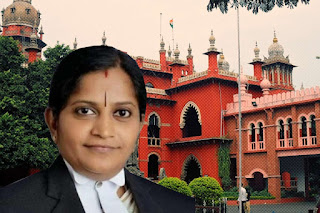Victoria Gowri Takes Oath as Madras HC Judge; Supreme Court Refuses To Entertain Plea
New Delhi: The Supreme Court on Tuesday declined to entertain a plea demanding to restrain lawyer Lekshmana Chandra Victoria Gowri from taking oath as an additional judge of the Madras high court.
Gowri took oath of office as the additional judge of the high court while the hearing was going on in the apex court.
"We are not entertaining the writ petition. Reasons will follow," said a special bench that included Justices Sanjiv Khanna and B R Gavai.
The oath to Gowri was administered by Madras high court Acting Chief Justice T Raja at around 10.48 am, while the SC was hearing arguments on why Gowri should not be elevated as HC judge.
There is a difference between eligibility and suitability
During the hearing, the bench told senior advocate Raju Ramachandran, who appeared on behalf of petitioners, that there is a difference between eligibility and suitability.
Ramachandran referred to Article 217 of the Constitution which deals with appointment and conditions of the office of a judge of a high court.
He said a person who is not in sync with the ideals and basic principles of the Constitution is not fit to take the oath because the oath talks of true faith and commitment to the Constitution.
The bench observed that the petitioners have placed certain materials on record and these things must have been placed before the Collegium also which had recommended Gowri's name for elevation as a judge on the high court.
Had made hate speeches: Bar members
Some bar members of the Madras high court had written to the CJI seeking recall of the recommendation made for appointing Gowri as an additional judge of the high court alleging she made hate speeches against Christians and Muslims.
They said Gowri’s personal views “against Muslims and Christians” is a relevant factor that should have been considered during the selection process. As such, the selection process was not an informed one and does not satisfy the need for an “effective consultation” as laid down in Article 217 (1) of the Constitution of India.

